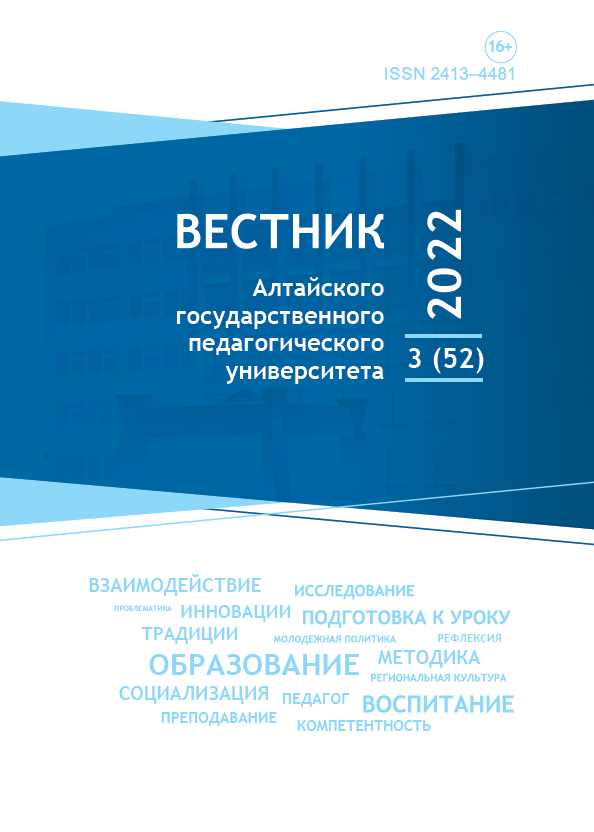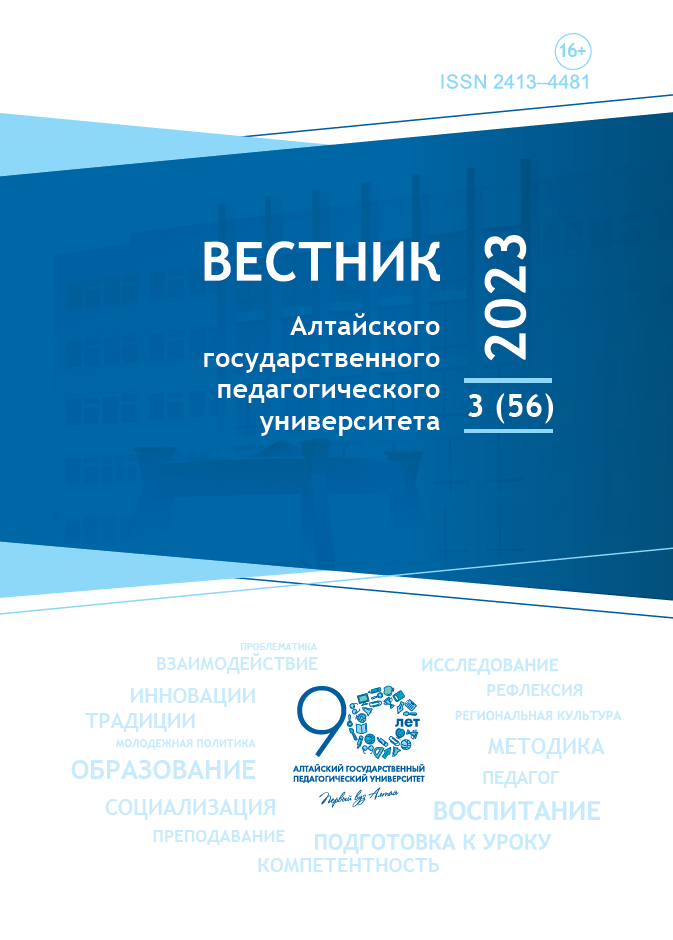PREDISPOSITION OF SCHOOLCHILDREN TO COMPUTATIONAL THINKING WHEN STUDYING DIGITAL TECHNOLOGIES
DOI:
https://doi.org/10.37386/2413-4481-2022-3-64-72Keywords:
computational thinking, new digital technologies, predisposition to computational thinkingAbstract
The article discusses the problem of measuring of the schoolchildren predisposition to computational thinking in the process of studying digital technologies in the framework of project activities for the robots creation. The structure of the model for measuring propensity, ability and susceptibility to computational thinking is described. A high degree of gender dependence of respondents for the “propensity” scale was found. It is established that teaching digital technologies most of all contributes to the formation of schoolchildren’ propensity for computational thinking.References
Lye S. Y., Koh J. H. L. Review on teaching and learning of computational thinking through programming: What is next for K-12? // Computers in Human Behavior. 2014. Vol. 41. P. 51-61. DOI 10.1016/j.chb.2014.09.012.
Босова Л. Л. Программирование как инструмент формирования вычислительного мышления обучающихся // Информатика в школе. 2020. № 10 (163). С. 4-10. DOI 10.32517/2221-1993-2020-19-10-4-10.
Каган Э. М. Обучение программированию как подход к развитию логического, абстрактного и вычислительного мышления у школьников // Вестник Российского университета дружбы народов. Серия: Информатизация образования. 2017. Т. 14, № 4. С. 442-451. DOI 10.22363/2312-8631-2017-14-4-442-451.
Хеннер Е. К. Вычислительное мышление // Образование и наука. 2016. № 2 (131). C. 18-33. DOI 10.17853/1994-5639-2016-2-18-33.
Берман Н. Д. Формирование вычислительного мышления в процессе обучения студентов вуза // Russian Journal of Education and Psychology. 2020. Vol. 11, No. 1. P. 16-19. DOI 10.12731/2658-4034-2020-1-16-19.
Shute V. J., Sun C., Asbell-Clarke J. Demystifying computational thinking // Educational Research Review. 2017.Vol. 22. P. 142-158. DOI 10.1016/j.edurev.2017.09.003.
Wing J. M.Computational thinking and thinking about computing // Philosophical Transactions of the Royal Society A: Mathematical, Physical and Engineering Sciences. 2008. Vol. 366. No. 1881. P. 3717-3725. DOI 10.1098/rsta.2008.0118.
Kumar K., Zindani D., Davim J. P.Introduction to Digital Thinking // Springer Briefs in Applied Sciences and Technology. Book Chapter. 2020. P. 51-58. DOI 10.1007/978-3-030-31359-3_4.
Kumar K., Zindani D., Davim J. P. Digital Thinking in Education // Springer Briefs in Applied Sciences and Technology. Book Chapter. 2020. P. 59-67. DOI 10.1007/978-3-030-31359-3_5.
Tekdal M. Trends and development in research on computational thinking // Education and Information Technologies. 2021. Vol. 26. No. 5. P. 6499-6529. DOI 10.1007/s10639-021-10617-w.
Tikva C., Tambouris E. Mapping computational thinking through programming in K-12 education: A conceptual model based on a systematic literature Review // Computers and Education. 2021. Vol. 162, No. 104083. DOI 10.1016/j.compedu.2020.104083.
Bai H., Wang X., Zhao L. Effects of the Problem-Oriented Learning Model on Middle School Students’ Computational Thinking Skills in a Python Course // Frontiers in Psychology. 2021. Vol. 127, No. 771221. DOI 10.3389/fpsyg.2021.771221.
Brennan K., Resnick M. New frameworks for studying and assessing the development of computational thinking // In Proceedings of the 2012 Annual Meeting of the American Educational Research Association, Vancouver, BC, Canada. 2012. 13-17 April. P. 25.
Zhang L., Nouri J. A systematic review of learning computational thinking through Scratch in K-9 // Computers and Education. 2019. Vol. 141, No. 103607. DOI 10.1016/j.compedu.2019.103607.
Tang X., Yin Y., Lin Q. Assessing computational thinking: A systematic review of empirical studies // Computers and Education. 2020. Vol. 148, No. 103798. DOI 10.1016/j.compedu.2019.103798.
Li Y., Xu S., Liu J. Development and Validation of Computational Thinking Assessment of Chinese Elementary School Students // Journal of Pacific Rim Psychology. 2021. Vol. 15. DOI 10.1177/18344909211010240.
Adams C., Cutumisu M., Lu C. Measuring K-12 Computational Thinking Concepts, Practices and Perspectives: An Examination of Current CT Assessments // Proceedings of Society for Information Technology & Teacher Education International Conference, In K. Graziano (Ed.). 2019. P. 275-285. Las Vegas, NV, United States: Association for the Advancement of Computing in Education (AACE).
Guggemos J., Seufert S., Román-González M. Measuring computational thinking - Adapting a performance test and a self-assessment instrument for German-speaking countries // 16th International Conference on Cognition and Exploratory Learning in Digital Age, CELDA 2019. P. 183-191. DOI 10.33965/celda2019_201911l023.
Law N., Niederhauser D. S., Christensen R. A multilevel system of quality technology-enhanced learning and teaching indicators // Journal of Educational Technology & Society. 2016. Vol. 19 (3). P. 72-83.
Bagarukayo E., Weide Th. P. van der Mbarika V. W. The impact of learning driven constructs on the perceived higher order cognitive skills improvement: Multimedia vs. Text // International Journal of Education and Development Using Information and Communication Technology. 2012. Vol. 8 (2). P. 120-130.
Jong M. S., Geng J., Chai C. S. Development and predictive validity of the computational thinking disposition questionnaire // Sustainability (Switzerland). 2020. Vol. 12 (111), No. 4459. DOI 10.3390/su12114459.
McLeod S. A. Likert Scale Definition, Examples and Analysis. URL: https://www.simplypsychology.org/likert-scale.html (дата обращения: 08.03.2022).
Наследов А. IBM SPSS Statistics 20 и AMOS: профессиональный статистический анализ данных. СПб.: Питер, 2013. 416 с.
Наследов А. Д. SPSS: Компьютерный анализ данных в психологии и социальных науках. СПб.: Питер, 2005. 416 с.
Downloads
Published
Issue
Section
License
Для публикации статьи в журнале «Вестник Алтайского государственного педагогического университета» автору необходимо заключить лицензионный договор с федеральным государственным бюджетным образовательным учреждением высшего образования «Алтайский государственный педагогический университет» (ФГБОУ ВО «АлтГПУ»).



